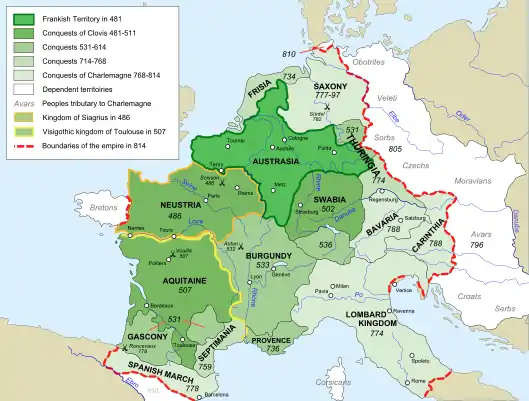774
Year 774 (DCCLXXIV) was a common year starting on Saturday (link will display the full calendar) of the Julian calendar. The denomination 774 for this year has been used since the early medieval period, when the Anno Domini calendar era became the prevalent method in Europe for naming years.
| Millennium: | 1st millennium |
|---|---|
| Centuries: | |
| Decades: | |
| Years: |
| 774 by topic |
|---|
| Leaders |
| Categories |
|
| Gregorian calendar | 774 DCCLXXIV |
| Ab urbe condita | 1527 |
| Armenian calendar | 223 ԹՎ ՄԻԳ |
| Assyrian calendar | 5524 |
| Balinese saka calendar | 695–696 |
| Bengali calendar | 181 |
| Berber calendar | 1724 |
| Buddhist calendar | 1318 |
| Burmese calendar | 136 |
| Byzantine calendar | 6282–6283 |
| Chinese calendar | 癸丑年 (Water Ox) 3470 or 3410 — to — 甲寅年 (Wood Tiger) 3471 or 3411 |
| Coptic calendar | 490–491 |
| Discordian calendar | 1940 |
| Ethiopian calendar | 766–767 |
| Hebrew calendar | 4534–4535 |
| Hindu calendars | |
| - Vikram Samvat | 830–831 |
| - Shaka Samvat | 695–696 |
| - Kali Yuga | 3874–3875 |
| Holocene calendar | 10774 |
| Iranian calendar | 152–153 |
| Islamic calendar | 157–158 |
| Japanese calendar | Hōki 5 (宝亀5年) |
| Javanese calendar | 669–670 |
| Julian calendar | 774 DCCLXXIV |
| Korean calendar | 3107 |
| Minguo calendar | 1138 before ROC 民前1138年 |
| Nanakshahi calendar | −694 |
| Seleucid era | 1085/1086 AG |
| Thai solar calendar | 1316–1317 |
| Tibetan calendar | 阴水牛年 (female Water-Ox) 900 or 519 or −253 — to — 阳木虎年 (male Wood-Tiger) 901 or 520 or −252 |

The Frankish Kingdom under Charlemagne
Events
Byzantine Empire
- Battle of Berzitia: The Bulgarian ruler (khagan) Telerig sends a small raiding army (12,000 men) to strike into the southwest of Macedonia, and capture Berzitia. Emperor Constantine V is informed about this raid by his spies in Pliska, and assembles an enormous force (80,000 men). He surprises the Bulgarians, who did not expect to find a Byzantine army there, and defeats them decisively. The Bulgars suffer heavy losses.
- Telerig sends a message to Constantine V, stating that he is going to flee in exile to Constantinople. In exchange, he asks the emperor to reveal the spies to his associates in Pliska for their own safety. Constantine sends the Bulgarian government a list of the spies; however, Telerig executes them all, and eliminates the Byzantine spy network within his government.[1]
Europe
- King Charlemagne conquers the Lombard Kingdom, and establishes Frankish rule in Pavia, Venetia, Istria, Emilia, Tuscany, and Corsica. Charlemagne visits Rome; he confirms the Donation of Pepin (see 756) while insisting on his own sovereignty. Pope Adrian I grants him the title of patrician. Charlemagne puts down immediate insurrections in Friuli.
- June – King Desiderius surrenders the independence of the Lombards to the Franks, and is exiled to Corbie Abbey (Picardy). Charlemagne annexes northern Italy as a sub-kingdom, and takes the title of Rex Langobardorum. Some Lombards flee south to Benevento, which remains independent; Duke Arechis II retitles himself "Prince of Benevento".
- Saxon Wars: Saxon raiders ravage much of northern Hesse (modern Germany), and burn the abbey at Fritzlar, putting the abbot and monks to the sword. Charlemagne hurriedly returns to Austrasia, assembles local troops, and recaptures Eresburg, before the approach of winter halts further operations.[2]
- King Aurelius dies after a 6-year reign, and is succeeded by his cousin-in-law Silo, as ruler of Asturias (Northern Spain).
Britain
- Unrest in the Northumbrian Church appears to lead to the expulsion of King Alhred, who is driven from his capital York. He sails from Bamburgh into exile amongst the Picts, where he is received by King Ciniod I. He is replaced by Æthelred I, the 11-year-old son of the late king Æthelwald Moll.
- King Offa of Mercia subdues the Anglo-Saxon kingdoms of Kent and Wessex (approximate date).
Astronomy
- A 1.2% growth of 14
C concentration recorded in tree rings, along with corresponding spikes of 36
Cl and 10
Be recorded in ice cores, suggests that a very strong solar storm may have hit Earth in either 774 or 775.[3]
Deaths
- date unknown
- Abd al-Rahman al-Awza'i, Muslim scholar (b. 707)
- Abu Mikhnaf, Muslim historian (approximate date)
- Amoghavajra, Chinese translator (b. 705)
- Kim Daeseong, Korean minister (b. 700)
- Aurelius, king of Asturias (Spain)
- probable
References
- Fine, John V. A. Jr. (1991) [1983]. The Early Medieval Balkans: A Critical Survey from the Sixth to the Late Twelfth Century. Ann Arbor: University of Michigan Press. p. 77. ISBN 0-472-08149-7.
- David Nicolle (2014). The Conquest of Saxony AD 782–785, p. 14. ISBN 978-1-78200-825-5
- Mekhaldi, Florian; Muscheler, Raimund; Adolphi, Florian; Aldahan, Ala; Beer, Jürg; McConnell, Joseph R.; Possnert, Göran; Sigl, Michael; Svensson, Anders; Synal, Hans-Arno; Welten, Kees C. (October 26, 2015). "Multiradionuclide evidence for the solar origin of the cosmic-ray events of AD 774/5 and 993/4". Nature Communications. 6 (1): 8611. doi:10.1038/ncomms9611. ISSN 2041-1723. PMC 4639793. PMID 26497389.
- Pandurang Bhimarao Desai (1970). A History of Karnataka: From Pre-history to Unification. Kannada Research Institute, Karnatak University. p. 115.
This article is issued from Wikipedia. The text is licensed under Creative Commons - Attribution - Sharealike. Additional terms may apply for the media files.